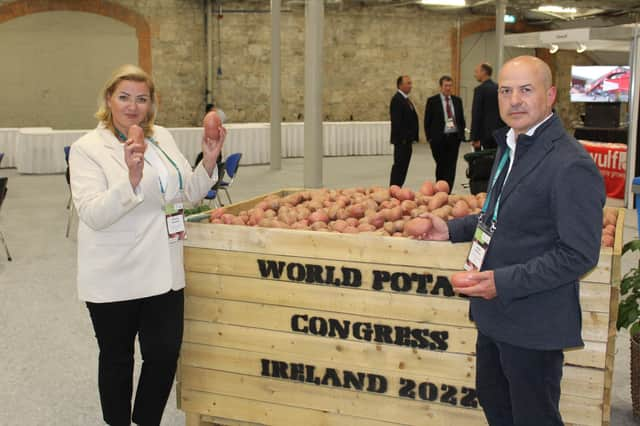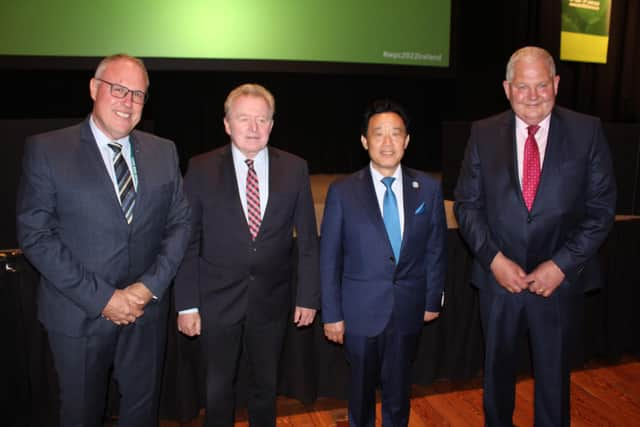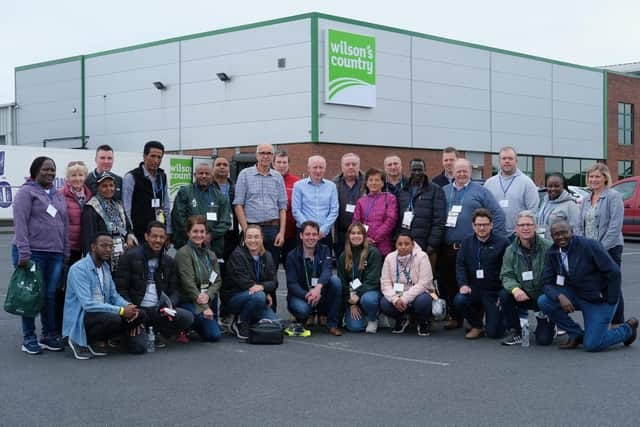Ireland hosts the 11thWorld Potato Congress


Some 900 potato industry delegates, from 60 different countries, gathered for the event, which was held at the Royal Dublin Society (RDS) in Dublin earlier this week.
Formal proceedings centred on the growing recognition that potatoes can help improve food security levels, particularly in those countries across North Africa and Asia, where famine remains a continuing threat.
Advertisement
Advertisement
Liam Glennon, the chair of the committee hosting the WPC, hailed the event a game changer for agriculture on the island of Ireland.


He spoke at the official opening of the congress, confirming the power of the potato, in every sense of the term, as a theme that has a growing resonance across all sectors of society.
Glennon was quick to confirm the scale of the challenge that has confronted Ireland’s WPC organising committee over the past four years.
He explained: “The event should have taken place 12 months ago. But the Covid-19 pandemic put paid to our 2021 plans.
Advertisement
Advertisement
“And, of course, the outbreak of war in Ukraine added significantly to the challenges confronting the organising committee.


“However, the continued support received from the Irish Potato Federation, numerous Irish state agencies and the event sponsors galvanised the commitment required to ensure that Dublin will be the centre of the global potato sector for the coming days.”
Glennon continued:“It is very appropriate that Ireland is hosting the WPC 175 years after Black 47, the year which saw the devastating impact of the Irish potato famine reach its peak.
“Potatoes are in Ireland’s DNA.”
Delegates attending the official opening of the WPC were reminded of the role played by potato breeders in Ireland over many years.
Advertisement
Advertisement
Liam Glennon particularly highlighted the popularity of the main crop Rooster variety, both in Ireland and abroad.
He continued:“Potatoes can look forward to a very sustainable future.
“The business opportunities that can be developed for the Irish potato sector over the next few days are immense.But the core news coming out of Dublin this week is the fact that potatoes will play a central role in alleviating poverty and hunger in many countries around the world.”
Delegates attending the event were told that the spectre of famine now haunts the world. The man delivering this message was IPC Inc president and CEO Romain Cools.
Advertisement
Advertisement
He added:“It is hard to believe that the world is facing up to such a challenge in the 21st century.
“The Covid 19 pandemic was partly responsible for this state of affairs with further pressure on world food security following in the wake of the war in Ukraine.”
But according to the WPC representative, potatoes can play a major part in meeting the growing challenge of food security that now exists in so many countries around the world.
He explained:“Potatoes are the world’s most efficient crop when it comes to both land and water utilisation.
Advertisement
Advertisement
“Their role in taking struggling communities out of poverty is obvious.”
The WPC representative stressed the need for farmers in developing countries to be given the means by which they can tackle the challenge of rocketing fertiliser, energy and fuel costs.
“Climate change is another fundamental issue that confronts these very same farmers head on,” he said.
“The good news is that potatoes can play a fundamentally important role in allowing all of these objectives to be met in full.”
Advertisement
Advertisement
Cools confirmed that discussions are ongoing between WPC and the United Nations’ Food and Agriculture Organisation (FAO) to further encourage the growing of potatoes around the world, adding:“Potatoes can be grown and eaten locally within a relatively short period of time.
“With the support of FAO we are currently seeking to develop an annual International Potato Day. This would ensure that one day in the year would be dedicated to the potato in ways that would encourage both the growing and consumption of such an amazingly versatile food source.”
The IPC representative also confirmed that this week’s events will culminate with a ‘Declaration of Dublin’.
This will signal the intention of all WPC members to encourage action by FAO on two fronts: to further promote the role of potatoes in tackling world hunger and to endorse the principle of an International World Potato Day.
Advertisement
Advertisement
Cools concluded:“Potatoes can be used to allow the world grow its food stocks in a totally sustainable manner.
“Apart from the tremendous yields that they can deliver, potatoes are an amazingly significant source of nutrition.”
WPC delegates were also told that the European Union (EU) is about to move the issue of food security to the very top of its priority agenda.
The man delivering this message was EU agriculture commissioner, Janusz Wojiciechowski, who spoke at the event’s official opening ceremony.
Advertisement
Advertisement
He added: “The war in Ukraine is deeply impacting food security levels throughout the Middle East and North Africa.
“Countries throughout that region depend heavily on imports of grain and oilseeds from the Black Sea area.”
The commissioner also pointed out that the issue of food security is now a priority for Europe.
He explained:“Steps must now be taken to increase food output across the EU. I look forward to future discussions with organisations such as the WPC to help identify the ways in which these objectives can be achieved.”
Advertisement
Advertisement
Wojiciechowski stated that the need to enhance food security levels in Europe now outweighed the EU’s previously confirmed commitments to sustainable management practises, where production agriculture is concerned - at least in the short term.
He thanked the European food industry for maintaining production levels throughout the pandemic. The commissioner paid particular tribute played by the potato sector in this context.
He continued:“I fully recognise the importance of the potato to Ireland, both historically and today.
“In my own country of Poland, the potato has a similar heritage. Potatoes are fundamentally important to our way-of-life.”
Advertisement
Advertisement
According to the commissioner, the basic connection between food, peace, and democracy is a founding principle of the European Union.
“As we move forward, this principle must continue to guide us,” he said.
“The current crisis in Ukraine has made it absolutely clear that food security must be a fundamental priority of the European Green Deal.
“For this, the Green Deal must be a good deal for farmers. Because a good deal for farmers is a good deal for society.
Advertisement
Advertisement
“The foundations of our society are rooted in food security. And the foundations of food security rest on the work of our farmers and the health of our environment: our climate, natural resources, and biodiversity.”
The commissioner concluded:“To support the foundations of our society, we must therefore support both the environmental requirements and economic realities of food production.
“In the European Commission, this is the approach we intend to take.
“In our reform of the Common Agricultural Policy, we are calling on Member States to provide strong incentives for environmental and animal welfare actions, and to reinforce the economic and social structures of their farming communities.”
Advertisement
Advertisement
It’s only when you meet someone actually farming in Ukraine that you get a sense of how bad conditions actually are in the country right now.
Mykola Gordiichuk, a member of the Ukrainian Association of Potato Growers attended this week’s WPC. He was accompanied by Wiktoria Jalowenko, a director of the Polish Ukrainian Chamber of Commerce.
Gordiichuk grows potatoes on two farms, one located close to Kviv: the other, a larger unit, is further to the east at Chernihiv – quite close to the border with Russia.
He commented:
“During the early days of the war Russian military personnel occupied the farm at Chernihiv.
Advertisement
Advertisement
“That area was subsequently liberated by Ukrainian forces. But when we eventually got up to the farm , what we found was a trail of absolute destruction, left by the Russian soldiers.”
Gordiichuk continued:“The first job that we had to do was clear the land of shells and other ordnance used by the Russian’s during their initial advance into Ukraine.
“The situation was so bad that we had to ask for help from Ukraine’s armed forces to complete the job: our biggest concern was that some of this discarded weaponry could still explode while the clear-up operation was underway.”
Subsequently, Gordiichuk got the all-clear to get on with planting out a potato crop for 2022.
Advertisement
Advertisement
“It took some time but we eventually sourced the seed, fertiliser and sprays that we needed,” he further explained.
“But crops were a month later in the ground than would normally be the case. This means that final yields will be significantly reduced come harvest time.”
Meanwhile, Ukraine’s farmers have lots of other issues to keep them occupied at the present time. One of the most pressing is that of clearing grain stores of last year’s harvest, so as to make room for crops grown in 2022.
“It’s critically important that ways are found of allowing Ukraine to sell the crops harvested last year,” confirmed Gordiichuk.
Advertisement
Advertisement
“If this does not happen, the country will lose out on a valuable source of income. But there is also the practical problem of ensuring that farmers have the means by which they can store crops harvested later this year.”
Mykola Gordiichuk is totally convinced that, in the end, Ukraine will defeat Russia on the battle field.
“But this is only the beginning of the way-back for Ukraine as a country,” he stressed.
“Russia is strategically obliterating the entire infrastructure of my country. When the war is over, the reconstruction challenge will be immense.
Advertisement
Advertisement
“Ukraine’s farming industry will require immense investment over the coming years.”
Gordiichuk concluded:“Ireland has always been very supportive of our cause. The need to build on this for the future is critically important.
“Ukraine is in directly the firing line right now between totalitarianism and the free world.
“There is a need for countries like Ireland and many others around the world to recognise this fundamental fact and act accordingly.”
Advertisement
Advertisement
Meanwhile, Ireland’s farm minister Charlie McConalogue believes that the country’s seed potato sector can grow significantly in the wake of Brexit.
This was a core issue that he touched upon courtesy of his opening address to the WPC.
The minister specifically highlighted the fact that Ireland is now the only country in the European Union (EU) that enjoys the highest accredited plant health status, where seed potatoes are concerned.
“This is a tremendous base upon which to grow the future of the sector,” he commented.